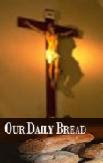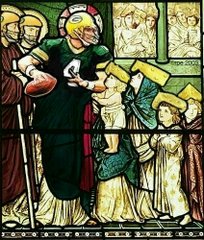The Introit, meaning entrance, marks the beginning of the Service of the Word. Our Confession & Absolution started out as a private matter, and was not a formal part of the Divine Service until latter times. As the priest entered the sanctuary and approached altar, a choir and or cantor would chant one of the Psalms, all the clatter & chatter & milling about of the congregation would stop, and everyone would assemble around the chancel.
Now if this practice sounds "catholic" to you, it is – for it is the way the church catholic, that is the true church throughout the world in all places and at all times. It is also orthodox – that is, it is the meet, right and salutary practice of the Word of God. It is also very Jewish, or Hebrew, for as is the case today and more often than not, the Introit comes from the Hebrew hymnal – the book of Psalms.

Back in the day of the Jerusalem temple, the people would chant a Psalm as they climbed the stairs and entered the temple court for worship. They had specific Psalms, called Psalms of Ascent, for this occasion. As with the gathering of the tittering masses in the cathedrals, the folk knew there was something very special about to happen, that happens nowhere else –the kingdom of heaven was being opened and they were being drawn into the presence of God.
The same is true today, though you would not know it from the way most "churches" worship on any given Sunday or other holy day.
Today’s Introit, while a wonderful message of God’s grace and the good news Gospel of salvation, is also an indictment on those who gather primarily as a way to make up for all the wrong that they have done during the week/month/year & earn their salvation, or to do a good work for God and others by which they may finish what God has started and get to heaven one day. Sadly, in the majority of churches, while you may get some mention of the forgiveness of sins because Jesus died on the cross, the majority of "worship" time is spent either in seeing how loudly & lavishly one can tell God what they think of Him and how much they love Jesus, or in learning how they can get to heaven one day if they only will have enough passion, and be filled with a blazing spirit that makes every human effort to live the Gospel for themselves and others.
Sadly, the sign found outside a certain LCMS Church for all the community to see, illustrates just how pervasive such false teaching about worship is:
"God takes care of our living when we take care of His business."
Our Introit today takes all that false worship and exposes it for what it really is – nothing more nor less than idolatry. Listen to the psalmist once again:
"I call to you; save me, that I may observe your testimonies."
Here we have a very clear OT passage from the liturgy of the Israelites placing salvation not only prior to works, but also effecting them. God takes care of our life – that IS His business.
This is the reason for their ascent into the Temple, the reason for the gathering of the masses around the chancel, and your being here today. You have been called to receive the forgiveness of sins delivered to you in your baptism for your salvation – only then will you be able to observe all of His testimonies, that is to live according to the Word and will of God.
Relating this to the Lord's Prayer, as delivered to us in today’s Gospel lesson, this Psalm can by understood this way:
"I call to you; save me" -- (forgive us our trespasses),
"that I may observe your testimonies" -- (as we forgive those who trespass against us).
Is this not what the Word and will of God boil down to? God speaks His Word to a world of sinners that all might be saved and have eternal life through His Son, Jesus Christ our Lord.
This comes out in vs. 5-13 of our Gospel, where Jesus is actually telling something of a parable by which He catechizes us with the "what does this mean" of the text of the prayer He just taught His disciples. It seems that with the words, " . . . how much more will your heavenly Father give the Holy Spirit to those who ask Him!" Luke 11:13, Jesus is saying that His teaching of prayer in the "Our Father" is for the purpose of asking for the Holy Spirit. I.e., only by the Holy Spirit does the kingdom of the Father come and His will done on earth as it is in heaven -- and His will is to give us the daily bread of life, the forgivness of sins, to lead us out of temptation and deliver us from the clutches of the evil one. Thus this prayer explains/describes the work of the Holy Spirit, which is centered in delivering the forgiveness of sins that is the bread of life.
And even more, as that work of the Holy Spirit is by His testimony of Christ, the prayer is centered in Christ when we consider Christ's words of John 6 that He IS the bread of life. As Prof. Arthur Just of our Fort Wayne seminary writes in his commentary, "The earthly and physical necessities of life surely are included in this petition and should not be minimized, but they do not exhaust the significance of "bread" in the gospel." To this I would add, the earthly and physical necessities actually set the table and help us understand the heavenl;y and spiritual necessities. Just quotes Luther as saying in "An Exposition of the Lord's Prayer for Simple Laymen," -- "The bread, the Word, and the food are none other than Jesus Christ our Lord Himself. Thus He declares in John 6:51, "I am the living bread which came down from heaven."
As you can see, it is consistent with the Word and teaching of Jesus Himself that Lord's Prayer, as with all of Scripture beginning with Moses and the prophets, speaks of Him, Christ the crucified and risen Savior.
 So when we pray the Lord’s prayer aren’t we really praying, "Give us this day our daily Jesus?"
So when we pray the Lord’s prayer aren’t we really praying, "Give us this day our daily Jesus?"There is no end to the places in this world from which we can receive our daily bread, if only we are given the freedom to seek it – i.e. "The pursuit of happiness." But without the daily bread of the forgiveness of sins it is all for naught.
You can have your daily bread, and your daily dessert too for that matter – RVs, vacations, entertainment, automobiles, homes far greater than what you need, etc. – but without the forgiveness of sins, without your daily Jesus, after a few short years of happiness relative to eternity, there will be an eternity of suffering and doing without the least of these things.
Luther speaks of the receiving, or not receiving, of the forgiveness of sins in Worship this way:
"God through Moses had issued a most rigorous prohibition against the impudence of inventing new forms of worship, as when He says: ‘You shall not offer in every place but at the place which the Lord your God will choose out of all your tribes to put His name and make His habitation there; . . .’" (cf. Deut. 12:4––6). . . . the false prophets used to fight against this viewpoint and say: ‘God is everywhere; therefore He can be adored and worshiped in every place, both in Bethel as well as on any other mountain.’ They did not have regard for the commandment of God. For when God fixes a certain manner and designates a certain place for His worship, it must not be said: ‘Wherever I will worship God, it will be pleasing to Him if only I do it in a godly and devoted manner,’ or, ‘I shall make offerings to Him wherever it pleases me.’ . . . The Turks and Jews are accustomed to speak in this manner today, claiming that they are able to serve God outside of the unity of faith and the church of Christ. Mohammed claims that anyone is saved in his own religion if he prays, if he gives alms, if he does other good works. It is not necessary for him to be a Christian or that he should be in the unity of Christ and the church. . . . This is true, indeed, that God is not bound, neither to Jerusalem nor to any other place, and that He is able to save also elsewhere. No one will deny this. But try it and see what you will get! If you invent forms of worship according to your own judgment, you will be in danger of God’’s wrath. By His almighty power God could save the human race without Christ, without Baptism, and without the Word of the Gospel. He could have illuminated men’’s hearts inwardly through the Holy Spirit and forgiven their sins without the ministry of the Word and of ministers. But it was not His will to do so. And God very strictly prohibited all erring forms of devotion and worship. When hypocrites say: ""Whatever is done with good intention is pleasing to God,"" those self-chosen devotions are to be condemned, and men should be reminded that they should direct their eyes where God has revealed Himself. . . . God abominates and condemns all erring thoughts outside the one and only revelation made in the Word and sacraments, to which He wished to gather us and in which He wished to include us. . . . He wants us to be gathered in connection with the Word and Baptism as by a sure and infallible sign because He wants to save us and help us, just as He promised He would listen at the mercy seat among the people of Israel. If you want to be absolved from your sins in this manner, go to your pastor, or to your brother and neighbor if your pastor cannot hear you; he has the command to absolve you and comfort you. Do not invent a special absolution for yourself. If you want to receive the Lord’’s Supper, go to the assembly of the church and the public congregation and receive it there. Do not devise a special administration and use of the sacraments. For God does not want us to go astray in our own self-chosen works or speculations, and so He gathers us together and encloses us within the limits of the Word so that we are not tossed about by every kind of doctrine (cf. Eph. 4:14). . . . So God wants all these things to be removed, and He sets forth His Word, which says: ‘Here you shall adore, worship, and make offerings. In the Word, in the Lord’s Supper, and in Baptism you have the remission of sins. With these you will have to be satisfied if you wish to be saved.’"
The sad and undeniable truth is that there are precious few places in this world that stick to these things the Lord has given and let them be sufficient -- where the daily bread of eternity, the daily bread of the forgiveness of sins, the daily bread of Jesus is available. However, this is not because there is a limit to Jesus and His forgiveness, but because so few seek Him where He is to be found according to His own command, so few are those that ask for what the Holy Spirit so freely gives.
Even within what is known as Christianity today, this daily bread is scarce. On the one hand you will find churches that tell you what you must do in order to earn the right to be forgiven. And on the other hand you will find churches that tell you what you must do to finish what God started. Neither of these actually deliver the complete loaf of forgiveness. Both reserve the daily Jesus for those who work for Him.
There is a saying that "you don’t know what you got til it’s gone." If people get so caught up in earning and fighting for the daily bread of this world, as well as their just desserts, they may find that they have no place left where they can receive the daily bread of eternal life.
So Jesus teaches us how to pray, not because we are illiterate and unable to speak for ourselves, but because we do not know what it truly means to pray in the Spirit for the things of the Spirit.
Every single petition of the Lord’s Prayer teaches us what the Father wishes to give us according to the Spirit and finds its fulfillment in Jesus.

- Our Father who art in heaven – gives the power of His right hand and the rule of all things visible and invisible to His one and only Son who is seated there with Him.
- Hallowed be Thy name – there is no other name but Jesus by which men might be saved, and no other name by which the Father might be known but through His Son.
- Thy kingdom come – only through Jesus does the kingdom of God come near to us, and only when He comes again will the resurrection fulfill that kingdom.
- Thy will be done on earth as it is in heaven – again, only through the Word and Him made flesh, is God’s will done. His will was for Christ to suffer, die and rise and for us to suffer, die and rise with Him.
- Give us this day our daily bread – Jesus IS the bread of life, that bread that never runs out, the bread that does not decay or leave one hungry and hour later.
- Forgive us our trespasses as we forgive those who trespass against us – it is finished in Jesus, and the Holy Spirit testifies to Him that we may receive it in our day and having received it, dispense the baskets full that are always left for as many as will receive it from us.
- And lead us not into temptation – as part of fulfilling all righteousness for us, Jesus overcame temptation in the wilderness and, as we hear the voice of our Shepherd, He leads us into temptation free pastures.
- But deliver us from evil – this our Father has done by uniting us with Christ in Baptism by the power of the Holy Spirit.
- For thine is the kingdom and the power and the glory forever and ever – all of these things has the Father given to His Son, who has poured His Spirit out upon us in abundance in order to deliver them to us here that we may have them to eternity.
- Amen. – Let it be so among us, even as Christ makes it so by dwelling among us today wherever His Word and Sacraments are delivered in all their fullness and purity.
Yes, the Spirit is given to all those that ask the Father for their daily Jesus and God’s kingdom comes on earth among us now even as it is in heaven where sin is nowhere to be found and life abounds – in he name of the Father and of the Son and of the Holy Spirit. Amen






4 comments:
Good exposition. Thanks.
I'd be interested to know your thoughts? Post a comment on my BLOG!
PEACE BE WITH YOU
MICKY
My pleasure, Chaplain. Thanks for checking in.
Isn't taht whyyou came to MY blog, Mickey?
I'll check yours out, though.
Izzy
Post a Comment